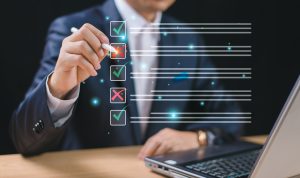 Imagine you’re an associate at a consulting firm. You’re surprised to see a new “AI Assist” button appear in your email application one morning. Without any training or guidance from your firm’s IT department, you decide to try it out, asking the AI to draft a response to a client’s inquiry about tax implications for a proposed merger. The AI confidently generates a response that looks professional and well-written, which you quickly review and send. Three days later, your managing partner calls you into their office—the AI cited outdated tax regulations and recommended a structure that would create significant liability for the client. The incident triggers an urgent internal review, revealing that dozens of employees have been using the undisclosed AI feature for weeks, potentially exposing the firm to professional liability and damaging client relationships.
Imagine you’re an associate at a consulting firm. You’re surprised to see a new “AI Assist” button appear in your email application one morning. Without any training or guidance from your firm’s IT department, you decide to try it out, asking the AI to draft a response to a client’s inquiry about tax implications for a proposed merger. The AI confidently generates a response that looks professional and well-written, which you quickly review and send. Three days later, your managing partner calls you into their office—the AI cited outdated tax regulations and recommended a structure that would create significant liability for the client. The incident triggers an urgent internal review, revealing that dozens of employees have been using the undisclosed AI feature for weeks, potentially exposing the firm to professional liability and damaging client relationships.
Articles Posted in Generative AI
California Legislature Passes Generative AI Training Data Transparency Bill (UPDATED)
The California legislature recently passed Assembly Bill 2013 (AB 2013) on August 27, 2024, a measure aimed at enhancing transparency in AI training and development. If signed into law by Governor Gavin Newsom, developers of generative AI systems or services that are made available to Californians would be required to disclose significant information on the data used to train such AI systems or services. This, in turn, may raise novel compliance burdens for AI providers as well as unique challenges for customers in interpreting the information.
Discovery Dilemma: An Update on the Legal Battle Between The New York Times and OpenAI
OpenAI’s defense of the lawsuit brought by The New York Times (“The Times”) has sparked controversy relating to OpenAI’s discovery demand for access to reporter notes and other behind-the-scenes materials associated with millions of articles that appeared in The Times.
Colleagues Jennifer Altman, Shani Rivaux and Macarena Fink provide a briefing on OpenAI’s discovery request in their recently published client alert, “Discovery Dilemma: An Update on the Legal Battle Between The New York Times and OpenAI.”
Legal Riffs: Music Industry Alleges AI Is Out of Tune
In late June, Universal Music Group (UMG) Records, Sony Music Entertainment, and other major record labels filed two complaints against two generative artificial intelligence (“gen AI”) music startups, Suno, Inc. (Suno) and Uncharted Labs, Inc. (Udio). The concurrently filed complaints allege that the gen AI technology produced by Suno and Udio directly infringes on copyrights owned by these record labels.
Colleagues Shani Rivaux, Macarena Fink and Catherine Perez provide a briefing on these complaints in their recently published client alert, “Legal Riffs: Music Industry Alleges AI Is Out of Tune.”
What You Need to Know If You’re Using AI-Generated Voices for Your Company
 Global music superstar Taylor Swift began her music career in Nashville, so we thought it fitting that on July 1, with the end of the Eras Tour in sight, the Ensuring Likeness Voice and Image Security (ELVIS) Act went into effect in Tennessee. This marks the latest front in the effort to navigate the interplay between the capability of generative AI and the Right of Publicity for music and voice artists alike.
Global music superstar Taylor Swift began her music career in Nashville, so we thought it fitting that on July 1, with the end of the Eras Tour in sight, the Ensuring Likeness Voice and Image Security (ELVIS) Act went into effect in Tennessee. This marks the latest front in the effort to navigate the interplay between the capability of generative AI and the Right of Publicity for music and voice artists alike.
Generative AI Hallucinations and the Risks of Fact-Free Certainty for Tax Research
With millions of people already using artificial intelligence (AI) to perform a variety of personal tasks and companies integrating large language model (LLM) services for professional use, concerns over the frequency with which generative AI produces inaccurate content—and for users who may too readily assume that the content is factual—are mounting, along with multiple examples of AI hallucinations and other misstatements. Some are disastrous, others humorous and some, just creepy. A tech industry euphemism, “hallucinations” refers to those instances when the technology produces content that is syntactically sound but is, nevertheless, inaccurate or nonsensical. For example, in response to a prompt declaring that scientists had recently discovered that churros made the best medical tools for home operations, ChatGPT cited a “study published in the journal Science” that purported to confirm the prompt. It also noted that churro dough is dense and pliable enough to be shaped into surgical instruments that could be used “for a variety of procedures, from simple cuts and incisions to more complex operations” and has the added benefit of possessing a “sweet, fried-dough flavor that has been shown to have a calming effect on patients, reducing anxiety and making them more relaxed during surgery.” ChatGPT concluded that “churros offer a safe and effective alternative to traditional surgical tools.”
Stormy Weather on a Starry Night: The Copyright Office Refuses Another AI-Generated Work
On December 11, the Review Board of the U.S. Copyright Office affirmed the refusal to register yet another AI-generated work. The decision follows the Office’s refusal to register Dr. Stephen Thaler’s A Recent Entrance to Paradise (which was affirmed in federal court, reported here, and is on appeal to the U.S. Court of Appeals for the District of Columbia), Kris Kashtanova’s Zarya of the Dawn (reported here), and Jason Michael Allen’s Théâtre D’opéra Spatial.
OpenAI Joins Other Generative AI Companies in Offering Indemnity for Users Against (Some) Third-Party Infringement Claims
For users of generative AI programs, a growing concern has been with potential liability resulting from infringement claims by copyright owners whose materials were used to train the AI. At its annual DevDay conference in early November, OpenAI became the latest major company to address this by offering to indemnify certain users of its ChatGPT chatbot.
Who (If Anyone) Owns AI-Generated Content?
 Whose content is it anyway? This is one of the questions that many hope will be answered by a federal court in Thaler v. Perlmutter. In June 2022, computer scientist Dr. Stephen Thaler sued the U.S. Copyright Office to redress the denial of his application to register copyright in his AI system’s visual output under the Office’s “Human Authorship Requirement.” A few months later, the Office again enforced this requirement, reversing its decision to register Kristina Kashtanova’s illustrated comic book, Zarya of the Dawn, after it became clear that AI was used to generate those images. While Thaler now asks a U.S. federal court to determine whether an AI system can author copyrightable work, and to effectively overrule the Office’s “Human Authorship Requirement,” it remains to be seen whether the court will tackle those broad issues, or instead narrowly focus on whether the Office had reasonable grounds to deny Thaler’s application.
Whose content is it anyway? This is one of the questions that many hope will be answered by a federal court in Thaler v. Perlmutter. In June 2022, computer scientist Dr. Stephen Thaler sued the U.S. Copyright Office to redress the denial of his application to register copyright in his AI system’s visual output under the Office’s “Human Authorship Requirement.” A few months later, the Office again enforced this requirement, reversing its decision to register Kristina Kashtanova’s illustrated comic book, Zarya of the Dawn, after it became clear that AI was used to generate those images. While Thaler now asks a U.S. federal court to determine whether an AI system can author copyrightable work, and to effectively overrule the Office’s “Human Authorship Requirement,” it remains to be seen whether the court will tackle those broad issues, or instead narrowly focus on whether the Office had reasonable grounds to deny Thaler’s application.
Finding the Right Note: ASCAP AI Initiatives
On June 13, 2023, the American Society of Composers, Authors and Publishers (ASCAP) announced a series of initiatives to guide and protect creators as artificial intelligence (AI) continues to develop and impact the music industry. ASCAP has a strong history of supporting artists, technological innovation and music royalties. Following in suit, ASCAP’s AI initiatives consist of a series of events and principles that seek to promote AI education, innovation and implementation in the music industry, and ensure that artists are justly compensated. The initiatives include the 2023 ASCAP Lab/NYC Media Lab Music and AI Challenge, the ASCAP Experience, the ASCAP AI Symposium, and ASCAPs AI Principles and Advocacy.
 Internet & Social Media Law Blog
Internet & Social Media Law Blog


